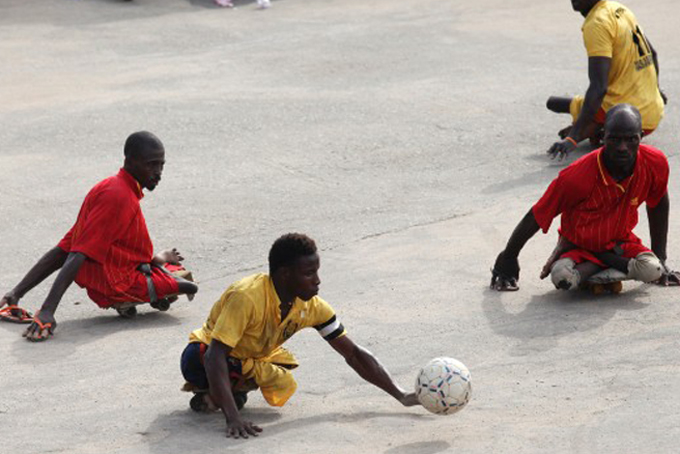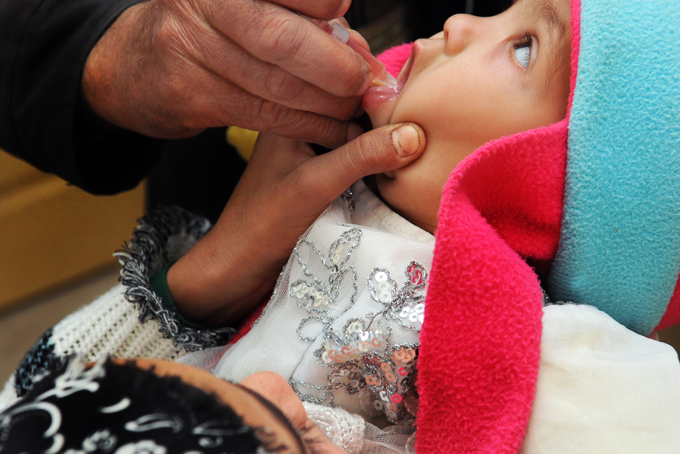
Nigerian para-soccers hold a game outside Lagos, Nigeria (AP Photo/File)
COMMENTARY
by Misbahu Lawan Didi
NIGERIA (CNN) — As a polio survivor, World Polio Day (Oct. 24) is more than a date on the calendar — it’s a reminder that we can and must end this crippling disease.
I grew up in the Kano state of Nigeria and contracted polio at age 3. This disease often causes paralysis and left me mostly paralyzed and unable to walk. My brothers had to help me move when we traveled long distances; even traveling to and from school was difficult.
Living with polio was not easy when I was younger, but I have found ways to cope and lead an active life. And that has given me a lot of strength. For example, I was very interested in soccer when I was young, and I later went on to found para-soccer, a nationally-recognized soccer-style game for people with disabilities in Nigeria.
While polio has not stopped me, I am determined to stop polio.

An Afghan child receives a polio vaccine orally during a visit to the Farah City hospital, in Farah City, Afghanistan. (Defense Department Photo/Navy/Lt. j.g. Matthew Stroup)
Children today shouldn’t have to go through what I’ve been through — especially when a few drops of the polio vaccine can protect them from the disease.
I have committed myself to raising awareness and educating people not just about polio, but about the importance of vaccinations. In fact, to mark World Polio Day in Nigeria, more than 300 polio survivors are actively participating in sporting activities across the country. On an ongoing basis, more than 1,000 survivors are actively campaigning for polio eradication in communities.
Empowering people affected by polio will strengthen our campaign against the disease and help spread the message that vaccinating our children is the only way to prevent them from similar fates.
Nigeria is the only polio endemic country in Africa and one of only three remaining countries (the others are Afghanistan and Pakistan) that have not been able to stop the transmission of the disease, according to the World Health Organization. If we fail to end polio in these countries, all other countries are at risk. This contagious disease can be imported, paralyzing children in countries that thought they were done with polio. A recent outbreak in the Horn of Africa is a reminder that we must finish the job.
In my country, we must make sure more children are vaccinated and overall immunity is higher, especially in the northern states. Every child that does not get polio drops breaks the circle of protection and exposes him or her and others to contracting the virus.
Challenges still exist in Nigeria, especially in reaching children in some communities where security is an issue, like Kano, Borno and Yobe. We are helping to fix this by ensuring local ownership by the government and communities themselves.
The good news is that we have made progress against polio in Nigeria and around the world. In Nigeria, the government, partners, and survivors are working hard, and polio cases are down right now compared to this time last year. Globally, polio cases have been reduced by more than 99 percent in the past 25 years.
Thanks to a worldwide effort of governments and the Global Polio Eradication Initiative, including the United Nations, the number of polio cases has dropped from 350,000 a year in 1988 to just 223 last year, and the number of countries where polio is transmitted has dropped from 125 to 3, according to the eradication initiative. I look forward to the day Nigeria overcomes the devastation of polio and joins the list of polio-free countries.
The Global Polio Eradication Initiative has developed a plan to end polio for good; now is the time for all of us to support this effort, educate our communities, and make sure our children are vaccinated.
On World Polio Day, my wish is that one day we end polio in Nigeria and in the world. I made my dream of playing soccer come true, and I believe we can make this one come true, too.
Editor’s note: Misbahu Lawan Didi is the national chairman of the Association of Polio Survivors of Nigeria. He lives with the effects of polio, getting around on a board with wheels. He is also the founder of para-soccer, for people with disabilities in Nigeria. Earlier this year, nine polio vaccinators were shot in the city of Kano. Didi shares his perspective on eradicating the disease in Nigeria.